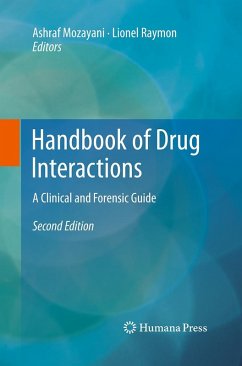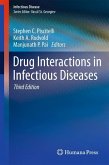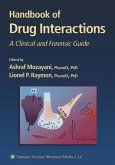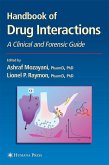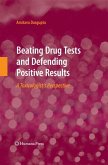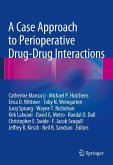Adverse drug reactions and interactions are still a major headache for healthcare professionals around the world. The US Food and Drug Administration's database recorded almost 300,000 serious adverse events in 2009 alone, of which 45,000 instances proved fatal. This updated new edition of the indispensable guide to drug interactions incorporates fresh research completed since the book's original publication by Humana Press in 2004. Additions include a new section on pharmacogenomics, a rapidly growing field that explores the genetic basis for the variability of responses to drugs. This new material reviews important polymorphisms in drug metabolizing enzymes and applies the findings to forensic interpretation, using case studies involving opiates as exemplars.
Existing chapters from the first edition have in most cases been updated and reworked to reflect new data or incorporate better tables and diagrams, as well as to include recent drugs and formulations. Recent references have been inserted too. The handbook features extra material on illicit drug use, with a new chapter tackling the subject that covers cocaine, amphetamines and cannabis, among others. The section on the central nervous system also deals with a number of drugs that are abused illicitly, such as benzodiazepines, opiates flunitrazepam and GHB, while so-called 'social' drugs such as alcohol and nicotine are still discussed in the book's section on environmental and social pharmacology. Focusing as before on detailed explanation and incorporating both pharmacokinetic and pharmacodynamic drug interactions, this book will continue to be a lodestar for health and forensic professionals as well as students.
Existing chapters from the first edition have in most cases been updated and reworked to reflect new data or incorporate better tables and diagrams, as well as to include recent drugs and formulations. Recent references have been inserted too. The handbook features extra material on illicit drug use, with a new chapter tackling the subject that covers cocaine, amphetamines and cannabis, among others. The section on the central nervous system also deals with a number of drugs that are abused illicitly, such as benzodiazepines, opiates flunitrazepam and GHB, while so-called 'social' drugs such as alcohol and nicotine are still discussed in the book's section on environmental and social pharmacology. Focusing as before on detailed explanation and incorporating both pharmacokinetic and pharmacodynamic drug interactions, this book will continue to be a lodestar for health and forensic professionals as well as students.
From the reviews of the second edition:
"This second edition outlines the most current information and highlights drugs of abuse while providing detailed information on the mechanisms of drug-drug interactions from a forensic toxicology perspective. ... Any health or forensic professional could use this book to explain the underlying pharmacology of drug-drug interactions. ... laboratory scientists conducting forensic analysis of drug interactions could use it to find thorough explanations of these interactions. ... the book is an excellent reference for those professionals searching for underlying mechanisms of drug-drug interactions." (Melissa M. Ranieri, Doody's Book Reviews, March, 2012)
"This second edition outlines the most current information and highlights drugs of abuse while providing detailed information on the mechanisms of drug-drug interactions from a forensic toxicology perspective. ... Any health or forensic professional could use this book to explain the underlying pharmacology of drug-drug interactions. ... laboratory scientists conducting forensic analysis of drug interactions could use it to find thorough explanations of these interactions. ... the book is an excellent reference for those professionals searching for underlying mechanisms of drug-drug interactions." (Melissa M. Ranieri, Doody's Book Reviews, March, 2012)

